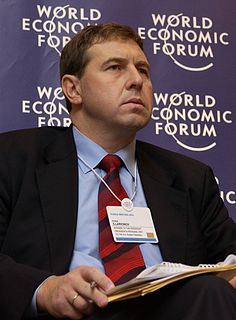A Quote by Andrey Illarionov
The Kyoto treaty ... has no scientific foundation
Quote Topics
Related Quotes
The Kyoto Treaty wasn't perfect, but we signed it, in fact, helped to draft it. And I'm very proud of it, it was the world's first commitment to doing something comprehensive on greenhouse gases and trying to reduce global warming before we do irreversible damage to many civilizations around the world.
The impact of the Kyoto Protocol on global temperature is quite modest, especially for the first century. The reduction in global mean temperature in the Annex I case relative to the reference in 2100 is 0.13ºC; this compares with a difference of 0.17ºC from the Kyoto Protocol calculated by Wigley. The temperature reduction in the optimal run is essentially the same as the Kyoto runs by the 22nd century.
You recalled the 1956 declaration, and this declaration established the rules that should be followed by both sides and that should be put into the foundation of a peace treaty. If you carefully read the text of this document, you will see that the declaration will take effect after we sign a peace treaty and the two islands [Kunashir and Shikotan] are transferred to Japan. It does not say on what terms they should be transferred and what side will exercise sovereignty over them.




































